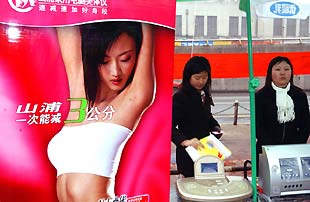Misleading radio, TV ads banned
By Zhu Zhe (China Daily)
Updated: 2006-07-21 05:55
Television and radio commercials for breast-enhancement treatments and
weight-loss products and equipment will be banned across the country starting
next month.
|
 |
|
TV and radio commercials for breast-enhancement
treatments and weight-loss products have drawn public anger. [China
Daily] | The State Administration of Radio, Film and Television and the State
Administration of Industry and Commerce (SAIC) issued the ban on Wednesday.
The ban is targeted at misleading advertisements in which some medical
organizations exaggerate the results of treatment, inviting "experts and
patients" to show the "magic effects," according to the two administrations.
Zhao Jian, deputy director of the SAIC's advertising supervision department,
said the problem is "very serious" and has harmed consumers' legitimate rights
and interests.
"Misleading commercials have also affected credibility of radio and
television," he said.
The Beijing Administration for Industry and Commerce (BAIC) received only one
complaint about TV direct-selling commercials in 2004, but the number soared to
451 last year.
The complaints focused on the exaggerated effect and poor quality of the
products, according to the BAIC.
Early this month, consumer rights watchdogs said they were investigating a
breast enhancement treatment that promises to transfer unwanted weight from the
hips to the breasts.
Bolibao, a "miracle" treatment touted on 17 TV stations, was accused in a
China Central Television documentary of causing gynaecological problems and of
having no effect at all.
So far the ban has gained wide public support and recognition from large TV
shopping companies.
Nine out of 10 people randomly surveyed on the street by China Daily said
such commercials should have been banned a long time ago.
Deng Chuanmei, a 40-year-old mother, said she felt embarrassed when she saw
some of the breast enhancement advertisements on TV, especially when she was
with her husband or 15-year-old son.
"Some of them are like pornographic movies," she said.
|